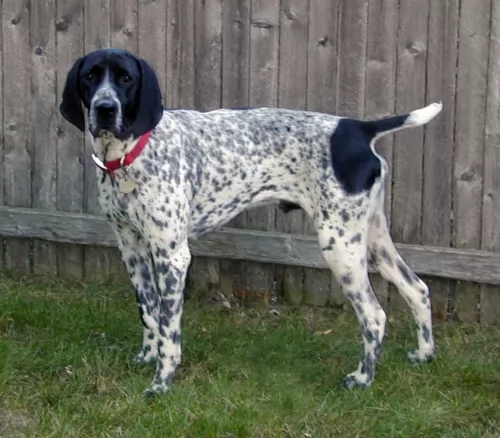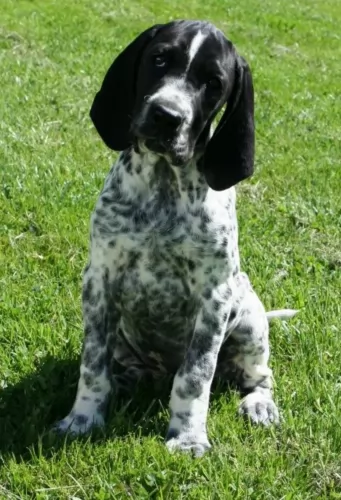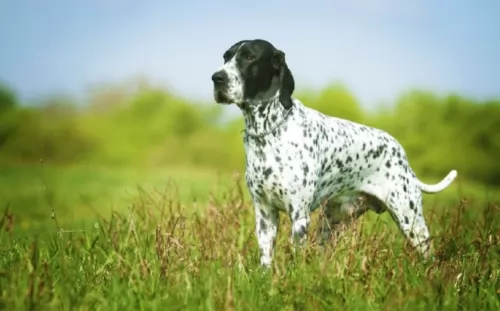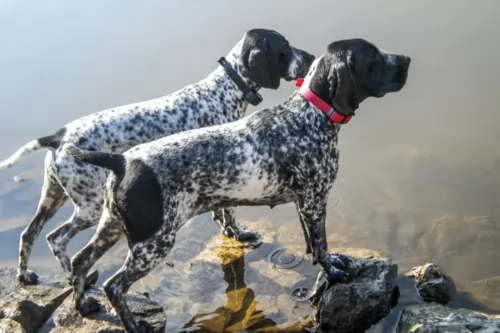 Petzlover
PetzloverBraque d'Auvergne is originated from France but North Country Beagle is originated from United Kingdom. Braque d'Auvergne may grow 20 cm / 8 inches higher than North Country Beagle. Braque d'Auvergne may weigh 51 kg / 113 pounds more than North Country Beagle. Both Braque d'Auvergne and North Country Beagle has almost same life span. Braque d'Auvergne may have more litter size than North Country Beagle. Both Braque d'Auvergne and North Country Beagle requires Low Maintenance.
 Sometime over 5 centuries ago, in the Cantal Region of France, was born a hunting breed, that might be the real ancestor of today’s pointing hunter dogs. Perhaps the oldest of all pointing gun dog is the Braque d’Auvergne. This breed comes from Central France in the region of Auvergne. This breed was developed prior to written dog breeding records in order to hunt in this region and find, point, flush out and retrieve fowl. This breed is clearly one of if not the oldest breeds in the French Braque. There is no agreement among historians on what breed is the oldest of the European pointing dogs and where they were developed – was it Spain or was it France? It is thought that the Braque Francais Gascogne is the original one of these in the early 1600’s while the Braque d’Auvergne came soon after. Due to the different hunting needs in the different parts of France, the Braque Francais Gascogne was crossed with a lot of other local scent hounds. The Braque d’Auvergne is one of the very oldest of all of these. There are records of the breeds existence in the 1700’s. It is probable that the Braque d’Auvergne was developed by crossing local dogs with Gascogne as well as with the Petit Bleu de Gascogne and the Grand Bleu de Gascogne.
Sometime over 5 centuries ago, in the Cantal Region of France, was born a hunting breed, that might be the real ancestor of today’s pointing hunter dogs. Perhaps the oldest of all pointing gun dog is the Braque d’Auvergne. This breed comes from Central France in the region of Auvergne. This breed was developed prior to written dog breeding records in order to hunt in this region and find, point, flush out and retrieve fowl. This breed is clearly one of if not the oldest breeds in the French Braque. There is no agreement among historians on what breed is the oldest of the European pointing dogs and where they were developed – was it Spain or was it France? It is thought that the Braque Francais Gascogne is the original one of these in the early 1600’s while the Braque d’Auvergne came soon after. Due to the different hunting needs in the different parts of France, the Braque Francais Gascogne was crossed with a lot of other local scent hounds. The Braque d’Auvergne is one of the very oldest of all of these. There are records of the breeds existence in the 1700’s. It is probable that the Braque d’Auvergne was developed by crossing local dogs with Gascogne as well as with the Petit Bleu de Gascogne and the Grand Bleu de Gascogne.
In all of Western Europe, the region of Auvergne is not very populated and has unique geography in that is hilly and has many extinct and eroded volcanoes. A lot of the region is still unpopulated. In this environment, wildlife has flourished, and hunting is successful in providing food for the regions people. This circumstance with an abundance of birds, led to the breeding of the Braque Auvergne to specialize in hunting in this area. The breed is not very popular outside of Auvergne and probably never was. That fact allowed them to be devastated by the Second World War. The Reunion des Amateurs de Braque d’Auvergne (RABA) was started to promote the pure breeding and the protection of the d’Auvergnes. But when Auvergnes was occupied during the war, the slowed breeding of the Braque d ‘ Auvergne almost eliminated the breed. There might have only been about 25 dogs left following the end of the war. These remaining dogs were used to revive the breed, but it is still uncommon, but not rare. Individuals have been imported by other countries including North America. The United Kennel Club (UKC) accepted the breed in 2006 but is not accepted by the AKC (American Kennel Club). The breed is still a working breed and outside of France, very rare.
Known also as the Northern Hound or the Northern Beagle, the North Country Beagle hailed from Britain and is extinct.
It hailed more specifically from- and was native to the Yorkshire and Northumberland regions of England. As a scenthound it was known for its hunting skills.
There isn’t much known about the dog but it is one of England’s oldest hound breeds, with much of its ancestry been lost. There are many theories surrounding the origins of this dog. Also, the date at which the North Country Beagle was developed is also debatable but it has always been a good hunter.
 The Braque d’Auvergne is a well built, strong hunting dog with long ears, a large head and a docked tail. His coat is white with black markings and black ears and head. The breed looks a lot like all the other pointing dogs from France. They are medium in stature and has the appearance of a working gundog. He is athletic, muscular and fit. Docking the tail is outlawed in many countries and all of the United Kingdom. In that case the tail is high on the rump and always straight. Their face and head are big for the size of the body and shaped like an oval. With a long muzzle, deep set eyes and a gentle expression, they are kindly and handsome dogs. Their skin is loose but not droopy or wrinkled like hound dogs.
The Braque d’Auvergne is a well built, strong hunting dog with long ears, a large head and a docked tail. His coat is white with black markings and black ears and head. The breed looks a lot like all the other pointing dogs from France. They are medium in stature and has the appearance of a working gundog. He is athletic, muscular and fit. Docking the tail is outlawed in many countries and all of the United Kingdom. In that case the tail is high on the rump and always straight. Their face and head are big for the size of the body and shaped like an oval. With a long muzzle, deep set eyes and a gentle expression, they are kindly and handsome dogs. Their skin is loose but not droopy or wrinkled like hound dogs.
The North Country Beagle seemed to vary quite a bit in size and because there isn’t much information on this extinct dog, we can assume he was much the same size of the Beagle we know today which is roughly 33 – 45cm in height and weighing between 9 and 11kg.
Not much is known about the dog’s appearance but it is believed that it looked much like the Southern Hound and English Foxhound. It was likely a medium sized dog with longish ears, thick bones but always agile and athletic.
There is very little known on what this dog’s temperament was like. He was strong willed and if you owned such a dog you would have had to have him trained and socialized. It was a dog that showed very little signs of aggression. It seemed the dog was friendly, social and loving to his human family.
 This is a gentle, adaptable and obedient breed. With their intelligence and affectionate nature, they make great family dogs and are eager to please their people. Living with other dogs is fine but not with small, prey size animals. The Braque d’Auvergne should never be left alone pets like gerbils and hamsters. They must be socialized to cats as pets and not prey before living with them successfully. They need to work closely with one human partner. They are first and foremost a hunting dog and need some sort of hunting simulation. They are devoted to their families and want to be constantly in their presence. This can lead to separation anxiety if they are left alone too much. They are great with children and need a family.
This is a gentle, adaptable and obedient breed. With their intelligence and affectionate nature, they make great family dogs and are eager to please their people. Living with other dogs is fine but not with small, prey size animals. The Braque d’Auvergne should never be left alone pets like gerbils and hamsters. They must be socialized to cats as pets and not prey before living with them successfully. They need to work closely with one human partner. They are first and foremost a hunting dog and need some sort of hunting simulation. They are devoted to their families and want to be constantly in their presence. This can lead to separation anxiety if they are left alone too much. They are great with children and need a family.
The North Country Beagle was a social, energetic dog who loved spending time with his human family. They were intelligent too, so training and socialization were possibly easy for him.
They weren't regarded as raucous kind of dogs and were fairly quiet. They were quite social and didn't like being left alone for too long. They were adaptable too, slotting quite easily into country- or city life.
Coolish with strangers, the North Country Beagle made a good pet and companion with a generally happy, contented disposition.
 The Braque d’Auvergne is a healthy breed but can face some of the same health concerns as other pointers and hunting dogs. The long, droopy ears can get infected easily if wet and need to be cleaned regularly so that food or dirt are not trapped their either. Because of the small gene pool however they may be at risk for several issues. The breeders in France express concerns about possible hip dysplasia and testing is highly recommended. Because they are at risk for other conditions that might not show up until later in life, it is also recommended that they be tested by the Canine Eye Registration Foundation (CERF) as well as the Orthopedic Foundation for Animals (OFA).
The Braque d’Auvergne is a healthy breed but can face some of the same health concerns as other pointers and hunting dogs. The long, droopy ears can get infected easily if wet and need to be cleaned regularly so that food or dirt are not trapped their either. Because of the small gene pool however they may be at risk for several issues. The breeders in France express concerns about possible hip dysplasia and testing is highly recommended. Because they are at risk for other conditions that might not show up until later in life, it is also recommended that they be tested by the Canine Eye Registration Foundation (CERF) as well as the Orthopedic Foundation for Animals (OFA).
The North Country Beagle had a lifespan of 12 to 15 years, and while he was a fairly healthy dog breed, there were some common health issues to look out for. Some of these were patellar luxation, epilepsy and glaucoma.
This is a condition where there is pressure in the eye and where there is inadequate fluid drainage as well. Left untreated, it can lead to permanent damage to the optic nerve which can lead to blindness.
It is fairly common in certain breeds. There is primary and secondary glaucoma and symptoms for instance with primary glaucoma can be this high pressure within the eye and also a cloudy appearance in front of the eye along with redness of the blood vessels and dilated pupils. There can also be headaches and loss of appetite.
 The Braque d’Auvergne needs a high-quality diet fit for a working dog but not too much to make him obese. They are an active breed to choose a formula that is designed for working dogs.
The Braque d’Auvergne needs a high-quality diet fit for a working dog but not too much to make him obese. They are an active breed to choose a formula that is designed for working dogs.
Although no studies have been conducted on the Braque d’Auvergne’s health issues there are many conditions that similar breeds are susceptible to and the d’Auvergne might be as well. This includes any of the following:
This is an active, working dog who needs a lot of stimulation and exercise. The only real appropriate exercise for these dogs is hunting or outings in the woods. He not only needs the exercise, but he also needs to stimulate his sense of smell and his gundog intelligence. He might excel in lure chase or even a form or barn hunt. They certainly could excel at obedience trials and perhaps rally. If you are a weekend hunter then this is the ideal dog for you. They are so easy to train that they surpass other pointers for success with casual hunters. They hunt at a slower pace than many other gundogs. Their intelligence and athleticism lend itself well to agility and flyball also. They need a large (+acres)fenced in area to run and play.
Your North Country Beagle was a social animal and he always had a whole lot of love and friendship to offer his human family.
Today, if you bring such a dog into your home, its your responsibility to care for him and provide him with love.
A puppy such as this would have been fed 4 times a day. As he got older he would have had his meals cut down to one or two a day. His owners would have chosen a dog food according to age and activity levels, but always made sure that the food was rich in vitamins and minerals.
Dry kibble has the advantage of keeping your dogs teeth clean. Home-made food was and is always a welcome treat and can occasionally be added to the dry kibble. Keep the food consistent and simple to avoid stomach upsets.
Boiled chicken, brown rice or pasta and some cooked vegetables such as carrots, sweet potato and spinach would have kept the Beagle happy and healthy and is an excellent diet today for modern dogs. Sometimes you can also give a little bit of raw meat. Never leave any dog without a constant supply of fresh, cool water.
Your North Country Beagle would have required lots of energy and will have required being exercised. His owners may have taken him for walks every day, and modern Beagles today would require ball games and games that also provide him with the chance to think and work things out.
If you bring a pet home such as what the North Country Beagle was like, as a puppy, you would have had to make a vet appointment to ensure he had his vaccinations to protect him from deadly diseases.
General grooming of your North Country Beagle would have required you brushing him twice a week, checking inside and outside his ears for infection. This is particularly of importance with floppy eared dogs like this. Check his eyes and teeth too. His nails couldn't be neglected either, as left long, they could have hooked onto objects, tearing and causing pain and bleeding.